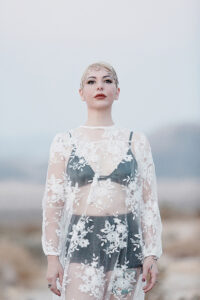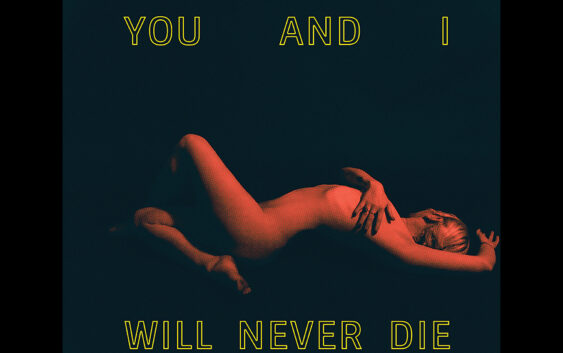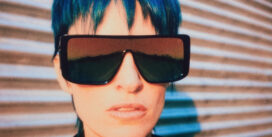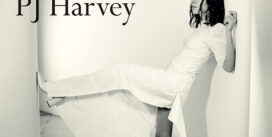Recently, KANGA dropped her second full-length album, You and I Will Never Die. Mixed by Justin McGrath (Nine Inch Nails) and Brett Romnes (Brand New), and mastered by Nick Townsend (Dr. Dre, Garbage), she really comes into her own on this one. The evolution of her songwriting style is complemented by the superb production value and the lyrics tell a story of love, loss, and what it means to be home. As someone who’s seen her captivate her audience even on small stages, it’s been inspiring and exciting to see her carving out her own niche in the dark alternative scene. I ran into her a few times at shows and clubs in LA and have always admired her kindness and graciousness towards fans, so I was happy to have a chance to talk with her about her latest album.
KANGA has toured with Gary Numan and The Black Queen among others, and has also played the Cold Waves Festival.Outside of her solo work, she’s a prolific sound designer for various film scores and has remixed 3TEETH and clipping.
Of You and I Will Never Die, she says, “Since we’ve all been denied the emotional release of a dance floor this year, I hope this album can take you to where you need to be. I know it’s done that for me.” You can hear it for yourself on her Bandcamp page.

So first of all it’s been really cool to see your evolution as an artist over the past few years and I really like the direction you take on your new album. I know this is sort of broad but when I read a recent bio of yours it said that you started this project in 2015 and I was kinda surprised, because it sounds very much like it’s been around for longer. Rewinding back to the beginning, how did the first album come about and what do you feel you’ve learned along the way? I know a little bit about how you worked with Rhys Fulber, for example…tell us more about that.
I’ve been making music, specifically producing, for about ten years now so maybe my work seems older because it reflects that? It’s hard to say because personally 2015 seems like a whole lifetime ago. My first album was basically a collection of tracks I had done without the initial intention to write an album. But it just sort of came together that way. I sent it over to Rhys for feedback and his response was that it was great and that he’d love to mix it. Eternal Daughter was also written more as a collection of tracks as well. However, my newest album, YOU AND I WILL NEVER DIE, was written from start to finish as a cohesive piece. I hope the intention and continuous narrative will add to the work and make it stand out both conceptually and artistically.
You toured with Gary Numan. That must have been totally surreal. What are some of your favorite Gary Numan songs or albums? I can definitely hear his influence in your sound…and of course you did that awesome cover of “Metal.”
Yeah that was the tour of a lifetime. It’s oddly fitting that that was how I left 2019 right before the world stopped turning. Gary is both a legend and a pioneer and is one of the only legacy artists that continues to outdo himself with his newer work. I think he is severely under appreciated for his current innovation. His stuff sounds fresher and more sonically interesting than most of what’s being put out now. It’s sort of ironic that so many artists in my peer group fetishize this nostalgic sound and rehash it over and over again, yet the actual originator of that sound is over here being the one pushing forward with the innovation and new styles. That’s probably what I take away most from Gary, his ability to remain untethered from predictability and comfort.
One of the things that really strikes me about your entire “brand” as KANGA is your independence and sense of entrepreneurship, for lack of a better word. You’re self-taught, which is fucking cool. You do your own thing onstage, of course. And you did a lot of your own promotion at first too, right? What’s that like? What are some of the challenges you’ve faced as you’ve made your way through the dark alternative scene? (I’m not gonna fixate/harp on the overdone question of “What is it like to be a woman in our scene” but if you’d like to expand on that topic, I’d love to hear it!)
It’s mostly a numbers game, honestly. It’s less about being a female and more about being solo (for the most part). When you’re by yourself you just don’t have the man-power to delegate different tasks to different band members. Not having a team for most of my career and not having any band mates put the burden on me to figure out how to wear all the hats that are required to do this. And honestly, that really does slow you down and put you at a disadvantage when you’re unable to dedicate 100% of yourself to one task.
I think my stubbornness and independence maybe came at the price of having a faster moving career, but at the end of the day I can go to sleep knowing that anyone who listens to my work or watches my performances knows that everything I do comes straight from me directly to them. I think it does create a unique and unfiltered bond between the artist and listener, and honestly I think it makes for a stronger fan base, albeit it smaller.
How has being associated with a label benefitted you versus being independent? I’m sorry if that question sounds like, really stuffy or something, I’m just curious as a fellow musician. I know the allure of being On A Label™ has changed with the music industry, but I’m sure there are still some plusses. Your first album was released on Negative Gain, then you got involved with Armalyte, right? And now Artoffact?
Yeah that’s a good question because it doesn’t really have a clear cut answer. I see lots of independent artists doing well without labels so there is a strong argument that labels aren’t as important as they once were. But I guess tying back into your previous question, for a solo artist, the benefits of having a team to take care of the day to day has an immeasurable impact on my own productivity and stress level. In my case the convenience compensates for the compromises. Plus Artoffact are just good people all around so even that helps to know that you have the support of well intentioned folks behind you.
You’ve always had a really strong pop sensibility, which appeals to me. However, a lot of other goth/industrial/etc acts don’t really go after that style. I kinda wish they would, but I digress. Do you ever feel like an outsider because your style is different? I see a lot of genre purists in our scene, a lot of gatekeeping. How do you navigate that?
It’s definitely been a struggle but at the end of the day if I wanted to do something safe and likable I would. I definitely know how to. But being safe turns me off and I rather like the challenge of creating pop music that still appeals to my own dark sensibilities. None of the artists who I think have lasting appeal do work that is “pure”. The Cure, NIN, Morrissey, etc are all pop writing machines but we look at them with a nostalgic lens that makes us forget that their lasting power came from their work being catchy, not from any sense of “purity”.
I think the key to making timeless music is staying away from stylistic boxes. It’s not only creatively suffocating but it honestly dates a piece of work in a way that I think makes it become stale. So I guess I’m trying to make stuff that can feel “timeless”. If I can do that, I can relinquish myself from the pressure of having my work be appreciated in my own lifetime.
Getting back to your new album, it feels a little grittier and more intense than Eternal Daughter. Which songs are you most proud of and what was your creative process like for this album? I’m thinking especially of “Godless” since it’s been stuck in my head for weeks, but I’m curious to hear about “Brother”, “Moscow,” and “Ritual City.” The lyrics for those three are especially striking.
YOU AND I was definitely written with a lot more narrative behind it. All the songs are driven from specific memories and experiences so I’m hoping that will provide the cohesiveness to hold together my stylistic meandering. I know it sounds corny to say but literally every song has that something to it that makes me love it. That’s why my albums are only 10 tracks. Absolutely no filler, ever. If a song isn’t my favorite song at the time of its completion then it gets trashed. But I’ll list some standout elements for me that maybe my more dedicated fans will appreciate:
“Home“ was the foundational track that took years to write but when it was completed, the whole rest of the album wrote itself. “Godless“ was really satisfying compositionally, I felt like I got my Masochistic Catholicism to dance which made me feel accomplished. “Brother” was intense. Everyone loved the instrumental but when I added those lyrics I had a handful of people say “no one is going to play this in a club.” Fuck that, I bet they will. Where’s everyone’s sense of humor?? Listen to the story, don’t get caught up in the disgust.
“Interlude“ and “Moscow“ were one song but I broke it up because it felt like a nice moment in the middle of the album. The original vocals I recorded for “Interlude“ I was bawling my eyes out. I considered keeping them but you could definitely hear a snot bubble in there. I like how I made a club banger with a cowbell but was still able to keep it delicate and sincere. “Ritual City“ was my fuck LA track (Ha! We all get one!). It’s a right of passage here.
“Say Goodbye“ is taken from an instrumental I wrote years ago to play live. It has some of my favorite vocal sampling and bass design I’ve ever done. But I did some surgery on it and turned it into an earnest expression of personal resentment towards people that I was never able to fully articulate before. “Waiting“ was one of the first tracks I wrote that really solidified the direction of the album. The “Waiting for it” motif started there and I ended up weaving it through the entire record (“Intro“, “Home“,“Say Goodbye“, and “Waiting“ all repeat it). The breakdown at the end is also a throwback to some of my heavier crescendos that I love doing. I had a very visceral response listening back to this track when I finished it.
And “Untie“ is sort of my flex to remind people that I can throw the box away and get experimental. But even then I add a catchy hook to close the thing out so I guess I can never fully escape being a pop princess.
I can tell that you pay a lot of homage to our “elders” and to 90s alternative music. Who are some of your favorite bands from that era?
The obvious Nine Inch Nails, Skinny Puppy, Smashing Pumpkins, Pigface, etc but I also love Fiona Apple, PJ Harvey, Alannis Morrisette, TLC, Dr. Dre, Sade, Nirvana, Soundgarden, Tool, RHCP (I‘m from SoCal, sorry) (Nothing to apologize for, Mother’s Milk is a classic!)… there’s really not much from that era that I wouldn’t turn up the radio for.
Your vocal style has really evolved and come into its own over the past couple of albums. Were you influenced by any singers in particular?
I wouldn’t say influenced so much as just motivated to become better. It’s my newest “skill” and the thing that comes slowest for me, which is sort of frustrating because you could argue that it’s probably the most important element in the type of music I make (I wouldn’t necessarily argue that, though).
But I will say that I’ve really gotten into the band Spiritbox lately. The singer has an absurdly vast range, it’s incredible. She can go from really beautiful ethereal vocals straight into the most heavy screaming imaginable. She rivals all other singer and screamers out there. I‘d love to work with her one day.
I’ve asked this question of everyone I’ve interviewed over the past year or so…how has the pandemic affected your workflow? How are you holding up? I know I really miss playing and going to shows as well as clubs.
How have you spent the time in isolation being unable to play and how much did that shape the evolution of your new album?
Well I wrote and produced the album before the pandemic, thankfully, but unfortunately the mixing and recording got severely delayed. Luckily I was able to work with Justin McGrath and Brett Romnes remotely so we were able to get everything wrapped up eventually. The inability to play live really hit hard especially since I had most of 2020 blocked out for touring. It really put in perspective how precarious it is to rely on touring for income (and sanity).
The pandemic has forced a lot of us to innovate new directions and techniques in this contact-less landscape which can be cool. I think there’s a lot to be explored in crypto platforms that are challenging the traditional ways music is licensed and monetized that could be truly revolutionary to this industry.
But at the end of the day I think we all are missing human contact. We’re all just waiting until we can dance together in a dimly lit bar.




